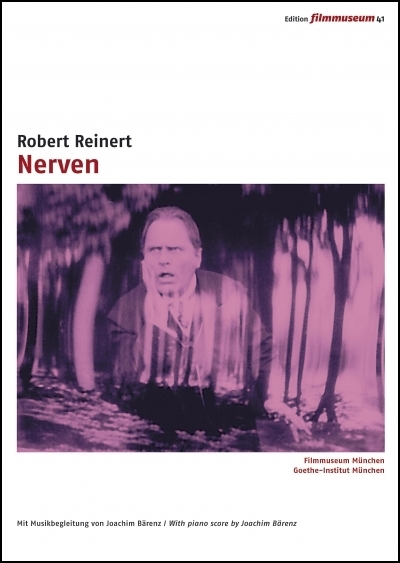GME DVD Distribution: Films On World War I and Its Aftermath
/Thomas Ince produced and directed CIVILIZATION in 1916, an anti-war film which was part of Hollywood’s support of President Wilson’s policy of staying out of WWI. But when the United States entered this conflict, all of Hollywood supported the war effort, including Ince. After the war, the studios were making films about people healing from its horrors and about a better understanding of the German people who were caught up in the war fever of that time in Europe. BEHIND THE DOOR (1919) offers a unique time capsule of the period. According to film historian Kevin Brownlow, Producer Thomas H. Ince and director Irvin V. Willat made “the most outspoken of all the vengeance films.”
Hobart Bosworth stars as Oscar Krug, a working-class American, who is persecuted for his German ancestry after war is declared. Driven by patriotism, Krug enlists and goes to sea. However, tragedy strikes when his wife sneaks aboard his ship and is captured following a German U-boat attack. Krug’s single-minded quest for vengeance against the sadistic German submarine commander (played with villainous fervor by Wallace Beery) leads to the film’s shocking and brutal climax.
The Thomas Ince Studio backlot was used for the village scenes; the water scenes where the battleships and U-Boat encounters take place were filmed in San Pedro Harbor, where Bosworth, the star of the film, did his own stunts. This newly restored edition, produced by Flicker Alley, represents the most complete version of the film available since 1919, thanks to the collaboration of the San Francisco Silent Film Festival, the Library of Congress, and Gosfilmofond of Russia. The numerous bonus features include the re-edited Russian version of the film, outtakes, and an in-depth interview with renowned film historian Kevin Brownlow.
◊
Abel Gance’s extraordinary breakthrough work, J’ACCUSE (1919), is a World War I drama considered to be one of the most technically advanced films of the era and the first major pacifist film, referred to by Gance as, “A human cry against the bellicose din of armies.” This seminal cinematic achievement stars Marise Dauvray as Edith, a young woman who is unhappily married to an older man, François (Séverin-Mars), though she’s actually in love with a young poet, Jean Diaz (Romuald Joubé).
Both Jean and François end up on the front lines of World War I while Edith is captured by German forces and suffers atrocities at the hands of the soldiers. Gance weaves individual human suffering against the larger horrors of war, depicted with stark realism. For the famous “March of the Dead” sequence at film’s end, Gance used real soldiers home on leave, many of whom returned directly to the front. J’ACCUSE introduced such technical advances as a rapid-cut editing style and highly expressive camerawork and lighting. Gance, who had served briefly in the military, returned to active service in order to film real battle scenes to include in the project. (Gance’s impressive follow up to J’ACCUSE was LA ROUE (1923), shot on location 13,000 feet high on Mont Blanc).
Two short films are also included in this DVD edition. PARIS DURING THE WAR (1915, directed by Henri Diamant-Berger) takes a comical look at Parisian life during wartime. FIGHTING THE WAR (1916), featuring amazing frontline photography of French soldiers, was shot during the battle of Verdun by adventurer Donald C. Thompson. The accompanying booklet for this DVD edition contains an extensive essay by celebrated author, director and film historian Kevin Brownlow. He draws from his own research and personal interviews with Gance. Paired with his essay is an additional text from historian Leslie K. Hankins, analyzing the influence J’ACCUSE had on the works of Virginia Woolf as well as its lasting impact on artists today. The Netherlands Filmmuseum also provides details on the film’s restoration. The restoration of J’ACCUSE is a joint project of Lobster Film Studios, Paris, and the Netherlands Filmmuseum with invaluable support also by celebrated film historian Kevin Brownlow, David Shepard and Lenny Borger.
◊
THE JOYLESS STREET (1925) takes place during the inflationary period in Vienna in the years immediately after World War I. The film stars Asta Nielsen (ASTA NIELSEN: THE ABYSS and FOUR FILMS WITH ASTA NIELSEN), Werner Kraus (NERVEN), Hertha von Walter, and a young Greta Garbo. The film was directed by G.W. Pabst (who was himself an admirer of Gance’s work). Contemporary film critics as well as film historians have always recognized THE JOYLESS STREET as a seminal film of the Weimar Republic, a film on the border between German Expressionism and Neue Sachlichkeit (New Objectivity). In the Deutsche Allgemeine Zeitung, Otto Friedrich wrote: that Pabst “achieves his goal in great style, does not tread on well-worn paths, presents new ideas which are uniquely his own, and with this achievement gives us a new hope. He captures the atmosphere of an idea, keeps redrawing it on the surface in ever more intensive images, in contrasts of action that make an ever-stronger impression. He illustrates the down-trodden souls of the era and the manic lust for pleasure of its people who are trying to do nothing more than escape for a few minutes from the terrible truth of the present.'’
THE JOYLESS STREET is also one of the most spectacular censorship cases of the era. While the film made its director G.W. Pabst famous, the state institutions of control guaranteed that no one would ever see the film in its original form. The film was considered too much of a provocation. It is replete with images of excessive decadence and abject poverty: “nouveau riche” financial speculators who wallow in Babylonian luxury, homeless and unemployed proletariat living in barns, women who sell their souls for a bit of fresh meat at the butcher's, arrogant but impoverished former bureaucrats unaware of their social slide, young social climbers willing to prostitute themselves with high society women, sexual orgies and bordellos, murder out of jealousy, murder out of despair, and, finally, a revolution in the streets. This DVD edition represents the most recent effort by archivists to reconstruct this censored film.
◊
Gerhard Lamprecht is most well known in film history circles for his multi-volume compilation (Deutsche Stummfilme) of German film productions, dating from 1903-1931. In 1963, he founded the Deutsche Kinemathek (Berlin). During the preceding period (1920-1958) he directed more than 60 films, and is best remembered today for his 1931 film version of EMIL AND THE DETECTIVES, scripted by Billy Wilder. The film archive which Lamprecht founded, together with Edition Filmuseum, has published four of his silent features from the nineteen twenties, paired in two separate DVD editions: SLUMS OF BERLIN (1925), together with CHILDREN OF NO IMPORTANCE (1926); and THE PEOPLE AMONG US (1926), with UNDER THE LANTERN (1928). Following revival showings of these films at the Pordenone and San Francisco silent film festivals and the Telluride Film Festival, the release of these DVD editions should further herald a rediscovery in academic circles of this oft-overlooked German film director.
All four films highlight both the desperation and resolve of the working class in Berlin during the tumultuous decade following World War I. Together, these films sketch a broad panorama of postwar Berlin. In SLUMS OF BERLIN, the engineer Robert Kramer, released from prison, cannot find his way back to civilian life. He wants to end his life, but is held back by the streetwalker Emma. THE PEOPLE AMONG US delineates the social microcosm of a tenement building; the tenants represent a cross-section of poverty, corruption and compassion. In UNDER THE LANTERN, the girl Else begins to follow the wrong path after an altercation with her father. The high life turns out to be the first step in a downward spiral. In CHILDREN OF NO IMPORTANCE (1926) three working-class children suffer under their violent foster parents, until a dramatic incident changes their lives.
Related Films of Interest Available from GME:
For the latest announcement about our releases please see GME's Spring 2018 DVD Release.


















